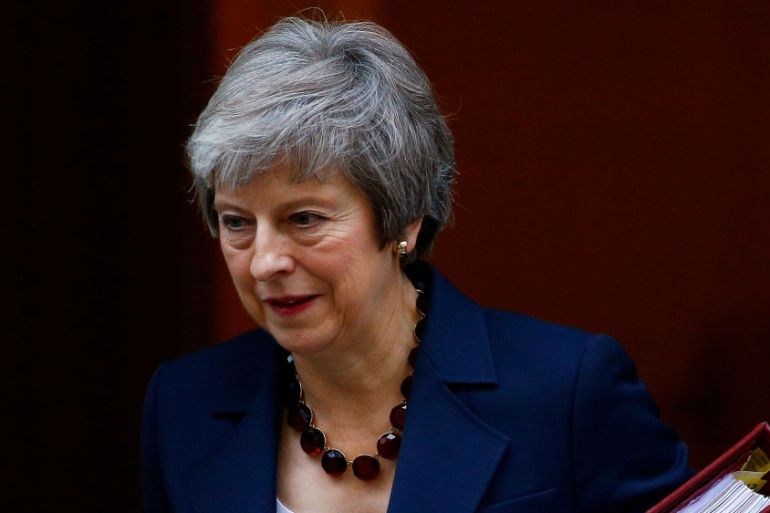May promises Brexit deal will deliver vote of British people
If the UK government agrees with the draft agreement, an EU vote could take place as soon as November 25.

British Prime Minister Theresa May has said the draft deal the United Kingdom has struck with the European Union with regards to Brexit will adhere to what people voted for during the 2016 Brexit referendum.
“What we have been negotiating is a deal that does deliver on the vote of the British people,” May told MPs on Wednesday after the UK and EU finalised the details of their plan on Tuesday.
Keep reading
list of 4 itemsNorthern Ireland agreement could end deadlock, restore government
Forced to become British: How Brexit created a new European diaspora
Number of Britons regretting Brexit hits new record high: Survey
May defended the agreement to a group of MPs from her own Conservative party ahead of a meeting with her cabinet, during which she is seeking her ministers’ backing for the deal.
Despite an earlier statement, Downing Street said May would not make an official statement on if the cabinet had agreed on the deal on Wednesday night.
Hardline Brexit supporters said the deal included unacceptable compromises.
May said the agreement would guarantee an end to unlimited immigration from the EU and would allow Britain to set its own trade policy, two of the main issues raised during the Brexit campaign.
She added the agreement included a backstop to avoid a hard border in Ireland but said this would be a temporary “insurance policy” if no future relationship is agreed.
“We want to bring the future relationship into place at the end of December 2020,” she said.
Accoriding to Al Jazeera correspondent Paul Brennan, the next 24 hours will be crucial for both Brexit and the Theresa May government as a whole.
“We are wondering now if the Brexit piece falling into place or the British government falleng into pieces,” Brennan said from London.
“The reaction has been almost universally opposed to the deal, both the Brexiteers and those who want to stay in the EU are extremely unhappy,” he said.
“Parliament seems to be at an impasse.”
The Irish border has been a key issue during negotiations between London and Brussels.
Both have vowed to prevent the re-emergence of a hard border between the Republic of Ireland and Northern Ireland, which will leave the EU with Britain, amid fears the issue could reignite decades-old tensions.
But the two sides disagreed for a long time on how to resolve the issue.
Jeremy Corbyn, leader of the main opposition Labour Party, said the agreement “breaches the prime minister’s own red lines”, adding that negotiations with Brussels had been “shambolic”.
“This government spent two years negotiating a bad deal that will leave the country in an indefinite half-way house,” Corbyn said.
Conservative Peter Bone, a leading pro-Brexit MP, also criticised May.
“You are not delivering the Brexit people voted for and today you will lose the support of many Conservative MPs and millions of voters,” Bone said.
Following the UK’s announcement an agreement was signed, Ireland’s Prime Minister Leo Varadkar said on Wednesday that an emergency EU summit could be held on November 25 to vote on the deal.
UK parliament would then vote on the Brexit accord.
If successful, the whole Brexit process should be concluded on March 29, 2019, almost three years after the referendum was held.
However, Brennan said that a failure for the cabinet to approve the deal could lead to real issues for May and her government.
“The timetable from now is that the cabinet has to approve, and if they don’t approve she will have to review her position as cabinet leader,” Brennan said.
“The real problems will arise in parliament, because there is no majority and if they don’t approve that’s when we’re really in uncharted territory because we might be looking at general elections,” he added.
Possible extension
The agreement comes after months of intense negotiations between UK and EU leaders and mounting pressure on May.
Last month, May said she was “ready to consider” extending a transition phase after the UK leaves, according to officials.
Such an extension, keeping Britain under EU governance with no say in it, would be highly unpopular with hardline supporters of Brexit.
The idea of a one-year extension to the transition period had been proposed by EU Brexit negotiator Michel Barnier.
This would buy more time to negotiate the future relationship between Britain and the EU, which could potentially help to make progress on the Irish border issue.